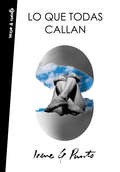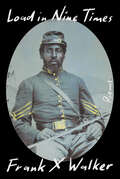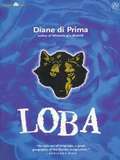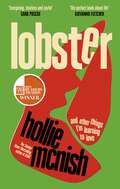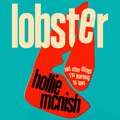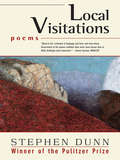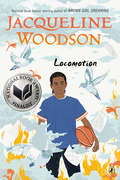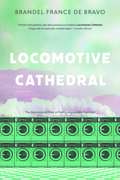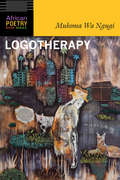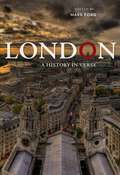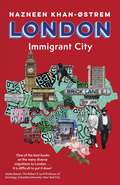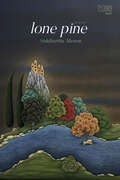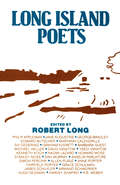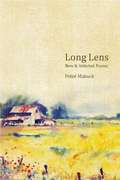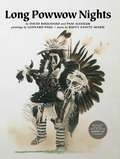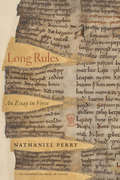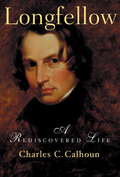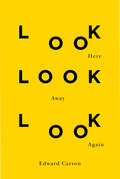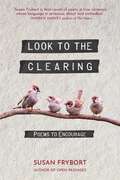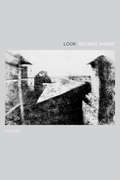- Table View
- List View
Lo que todas callan
by Irene G PuntoLo que todas callan es un poemario visceral y sensitivo sobre algo de lo que nunca se ha hablado en poesía: el posparto y el origen de los sentimientos maternales. Lo que todas callan es el resultado de mi encuentro con el amor, el dolor, el silencio y la supervivencia convertido en versos dispuestos a poner luz a muchos tabúes que, como mujer y como madre, me bebí sin sed. La RAE dice que el posparto es el periodo que transcurre desde el parto hasta que la mujer vuelve al estado ordinario anterior a la gestación. Pero para mí esta definición es inexacta y vengo con un puñado de poemas para enriquecerla. Reseñas:«Este libro es una reconciliación, pero también es volver a abrir unas heridas que no sanarán del todo nunca. Afortunadamente. Unas cicatrices hechas poema que me dicen que yo también estuve ahí, en ese lugar del que nadie me había hablado.»Zahara «Irene G Punto ha cogido un margeny lo ha hecho suyo. Hablo del margen de la maternidad en general, y del margen del posparto en particular. Pocas veces se había escrito así sobre un momento de la vida del cuerpo de quien fue madre en el que todo pueden ser sombras iluminadas por unas leves y diminutas luces.»Luna Miguel «Hay dos formas de ser original y merecer ser oído: decir lo que nadie sabe o lo que muchos ocultan. Este libro tiene el valor de hacer lo segundo, porque abre una ventana de la maternidad que estaba condenada y por la que ahora entra el sol y la luz, pero también el frío. Sus poemas los ha escrito Irene G Punto, pero los firmarían Anne Sexton o Sylvia Plath.»Benjamín Prado
Load in Nine Times: Poems
by Frank X. WalkerA stirring and historically substantive tribute to literal freedom fighters that provides inspiration and instruction for all who believe in liberation in illiberal times. —Cortney Lamar Charleston For decades Frank X Walker has reclaimed essential American lives through his pathbreaking historical poetry. In this stirring new collection, he reimagines the experiences of Black Civil War soldiers—including his own ancestors—who enlisted in the Union army in exchange for emancipation. Moving chronologically from antebellum Kentucky through Reconstruction, Walker braids the voices of the United States Colored Troops with their family members, as well as slave owners and prominent historical figures from Abraham Lincoln to Frederick Douglas and Margaret Garner. Imbued with atmospheric imagery, these persona poems and more “[clarify] not only the inextricable value of Black life and labor to the building of America, but the terrible price they were forced to pay in producing that labor” (Khadijah Queen). “How do you un-orphan a people?” Walker asks. “How do you pick up / shattered black porcelain and make / a new set of dishes fit to eat off?” While carefully attuned to the heartbreak and horrors of war, Walker’s poems pay equal care to the pride, perseverance, and triumphs of their speakers. Evoking the formerly enslaved General Charles Young, Walker hums: “I am America’s promise, my mother’s song, / and the reason my father had every right to dream.” Expansive and intimate, Load in Nine Times is a resounding ode to the powerful ties of individual and cultural ancestry by an indelible voice in American poetry.
Loba
by Diane Di PrimaLoba is a visionary epic quest for the reintegration of the femimine, hailed by many as the great female counterpart to Allen Ginsberg's Howl when the first half appeared in 1978. Now published for the first time in its completed form with new material, Loba, "she-wolf" in Spanish explores the wilderness at the heart of experience, through the archetype of the wolf goddess, elemental symbol of complete self-acceptance. .
Loba
by Diane Di PrimaLoba is a visionary epic quest for the reintegration of the femimine, hailed by many as the great female counterpart to Allen Ginsberg's Howl when the first half appeared in 1978. Now published for the first time in its completed form with new material, Loba, "she-wolf" in Spanish explores the wilderness at the heart of experience, through the archetype of the wolf goddess, elemental symbol of complete self-acceptance.
Lobster: and other things I’m learning to love: 'energising, fearless and joyful' Sara Pascoe
by Hollie McNishA brand-new collection from the award-winning poet, the companion piece to the Sunday Times bestselling Slug'Funny, so smart and refreshingly honest' SARAH MILLICAN'Hollie McNish's words always sweep me away' GIOVANNA FLETCHERThis book is written out of both hate and love for the worldAs people, we are capable of both love and hate; amazement and disgust; fun and misery. So why do we live in a world that is constantly telling us to hate, both ourselves and others? We are told to be repulsed by our own bodies, bodies that let us laugh and sweat and eat toast; to be ashamed of pleasure; to be embarrassed by fun. In this collection, Hollie McNish brings her inimitable style to the question of what have been taught to hate, and if we might learn to love again.'Never have we needed her more' STYLIST'I've loved her work for years' JO BRAND'She writes with honesty, conviction, humour and love' KAE TEMPEST
Lobster: and other things I’m learning to love: 'energising, fearless and joyful' Sara Pascoe
by Hollie McNishA brand-new collection from the award-winning poet, the companion piece to the Sunday Times bestselling Slug'Funny, so smart and refreshingly honest' SARAH MILLICAN'Hollie McNish's words always sweep me away' GIOVANNA FLETCHERThis book is written out of both hate and love for the worldAs people, we are capable of both love and hate; amazement and disgust; fun and misery. So why do we live in a world that is constantly telling us to hate, both ourselves and others? We are told to be repulsed by our own bodies, bodies that let us laugh and sweat and eat toast; to be ashamed of pleasure; to be embarrassed by fun. In this collection, Hollie McNish brings her inimitable style to the question of what have been taught to hate, and if we might learn to love again.'Never have we needed her more' STYLIST'I've loved her work for years' JO BRAND'She writes with honesty, conviction, humour and love' KAE TEMPESTPLEASE NOTE: When you purchase this title, the accompanying PDF will be available in your Audible Library along with the audio.
Lobster: and other things I’m learning to love: 'energising, fearless and joyful' Sara Pascoe
by Hollie McNishA brand-new collection from the award-winning poet, the companion piece to the Sunday Times bestselling Slug'Funny, so smart and refreshingly honest' SARAH MILLICAN'Hollie McNish's words always sweep me away' GIOVANNA FLETCHERThis book is written out of both hate and love for the worldAs people, we are capable of both love and hate; amazement and disgust; fun and misery. So why do we live in a world that is constantly telling us to hate, both ourselves and others? We are told to be repulsed by our own bodies, bodies that let us laugh and sweat and eat toast; to be ashamed of pleasure; to be embarrassed by fun. In this collection, Hollie McNish brings her inimitable style to the question of what have been taught to hate, and if we might learn to love again.'Never have we needed her more' STYLIST'I've loved her work for years' JO BRAND'She writes with honesty, conviction, humour and love' KAE TEMPEST
Local Visitations: Poems
by Stephen DunnWise and searching new poems from the winner of the 2000 Pulitzer Prize in Poetry. In his twelfth collection, his first since winning the Pulitzer Prize, Stephen Dunn turns his keen gaze on Sisyphus, our contemporary Everyman. Free, for the time being, from the power of the gods and the ceaseless weight of the rock, he struggles to navigate twenty-first-century America. In language by turns mordant and tender, often elegiac, Dunn illuminates the quotidian burdens of his all-too-human hero, as well as the abrasions of ambivalence and choice, finally concluding that "here / and there, though mostly here, even fate is reversible / with struggle or luck." In a second sequence of poems, nineteenth-century novelists become "local visitors" to the author's South Jersey towns. "Chekhov in Port Republic," "Jane Austen in Egg Harbor," "Dostoyevsky in Wildwood": these inventions and others give Dunn provocative new latitudes. As in his previous books, "he balances the casual and the vivid as he plumbs the ambiguity and mystery of human relations" (New York Times Book Review).
Locomotion (New Windmill Ser.)
by Jacqueline WoodsonFinalist for the National Book AwardWhen Lonnie was seven years old, his parents died in a fire. Now he's eleven, and he still misses them terribly. And he misses his little sister, Lili, who was put into a different foster home because "not a lot of people want boys-not foster boys that ain't babies." But Lonnie hasn't given up. His foster mother, Miss Edna, is growing on him. She's already raised two sons and she seems to know what makes them tick. And his teacher, Ms. Marcus, is showing him ways to put his jumbled feelings on paper.Told entirely through Lonnie's poetry, we see his heartbreak over his lost family, his thoughtful perspective on the world around him, and most of all his love for Lili and his determination to one day put at least half of their family back together. Jacqueline Woodson's poignant story of love, loss, and hope is lyrically written and enormously accessible.
Locomotive Cathedral (The Backwaters Prize in Poetry Honorable Mention)
by Brandel France de BravoWith wit and vulnerability, Brandel France de Bravo explores resilience in the face of climate change and a global pandemic, race, and the concept of a self, all while celebrating the power of breath as &“baptism on repeat.&” Whether her inspiration is twelfth-century Buddhist mind-training slogans or the one-footed crow who visits her daily, France de Bravo mines the tension between the human desire for permanence and control, and life&’s fluid, ungraspable nature. Poem by poem, essay by essay, she builds a temple to the perpetual motion of transformation, the wondrous churn of change and exchange that defines companionship, marriage, and ceding our place on Earth: &“not dying, but molting.&”
Logotherapy (African Poetry Book)
by Mukoma Wa NgugiWritten as a tribute to family, place, and bodily awareness, Mukoma Wa Ngugi’s poems speak of love, war, violence, language, immigration, and exile. From a baby girl’s penchant for her parents’ keys to a warrior’s hunt for words, Wa Ngugi’s poems move back and forth between the personal and the political. In the frozen tundra of Wisconsin, the biting winds of Boston, and the heat of Nairobi, Wa Ngugi is always mindful of his physical experience of the environment. Ultimately it is among multiple homes, nations, and identities that he finds an uneasy peace.
Lok Kavi Shahir Ramjoshi: लोककवी शाहीर रामजोशी
by Shirish Gandheमहाराष्ट्राच्या राजकीय, सामाजिक, शैक्षणिक, सांस्कृतिक, आर्थिक व वैचारिक जडणघडणीत ज्या दिवंगत महनीय व्यक्तींचा महत्त्वपूर्ण सहभाग आहे अशा व्यक्तींची साधारणतः शंभर ते सव्वाशे पानाची सुबोध मराठी भाषेत चरित्रे लिहून ती “महाराष्ट्राचे शिल्पकार” या योजनेअंतर्गत पुस्तकरुपाने प्रकाशित करण्याची मंडळाने योजना आखली असून या चरित्रग्रंथमालेतील “लोककवी शाहीर रामजोशी” हा तेविसावा चरित्रग्रंथ आहे. लोककवी शाहीर रामजोशी हा शाहिरांचा मुकूटमणी आहे आणि म्हणूनच “महाराष्ट्राचे शिल्पकार” या मंडळाच्या चरित्रग्रंथमालेअंतर्गत या शाहिरावरचा चरित्रग्रंथ प्रकाशित करण्यात मंडळाला विशेष आनंद होत आहे. प्रा. शिरीष गंधे यांनी या चरित्रग्रंथाचे लेखन समरसून तर केलेले आहेच; पण त्याशिवाय चरित्रग्रंथासाठी रूढ असलेल्या लेखन पद्धतीचा अवलंब न करता कथात्मक लेखन पद्धतीचा अवलंब केला आहे. प्रसंगाची मांडणीही अतिशय नाट्यपूर्ण रीतीने केलेली आहे. अर्थात अशा लेखन पद्धतीचा अवलंब केल्यास चरित्रग्रंथात काही त्रुटी संभवतात; पण या ग्रंथात अशा त्रुटी अभावानाच आढळतात.
London: A History in Verse
by Mark FordCalled “the flour of Cities all,” London has long been understood through the poetry it has inspired. Now poet Mark Ford has assembled the most capacious and wide-ranging anthology of poems about London to date, from Chaucer to Wordsworth to the present day, providing a chronological tour of urban life and of English literature.Nearly all of the major poets of British literature have left some poetic record of London: Chaucer, Spenser, Shakespeare, Donne, Milton, Dryden, Pope, Johnson, Wordsworth, Keats, Byron, and T. S. Eliot. Ford goes well beyond these figures, however, to gather significant verse of all kinds, from Jacobean city comedies to nursery rhymes, from topical satire to anonymous ballads. The result is a cultural history of the city in verse, one that represents all classes of London’s population over some seven centuries, mingling the high and low, the elegant and the salacious, the courtly and the street smart. Many of the poems respond to large events in the city’s history—the beheading of Charles I, the Great Fire, the Blitz—but the majority reflect the quieter routines and anxieties of everyday life through the centuries.Ford’s selections are arranged chronologically, thus preserving a sense of the strata of the capital’s history. An introductory essay by the poet explores in detail the cultural, political, and aesthetic significance of the verse inspired by this great city. The result is a volume as rich and vibrant and diverse as London itself.
London: Immigrant City
by Nazneen Khan-ØstremTRANSLATED BY ALISON McCULLOUGH'One of the best books on the many diverse migrations to London . . . revealing the extent to which the diversity of immigrant origins has had transformative effects - through food, music, diverse types of knowledge and so much more. The book is difficult to put it down'Saskia Sassen, The Robert S. Lynd Professor of Sociology, Columbia University, New York'The ultimate book about Great Britain's capital'Dagbladet'One of the best books of the year! . . . This is a book about what a city is and can be'AftenpostenIs there a street in London which does not contain a story from the Empire? Immigrants made London; and they keep remaking it in a thousand different ways. Nazneen Khan-Østrem has drawn a wonderful new map of a city that everyone thought they already knew. She travels around the city, meeting the very people who have created a truly unique metropolis, and shows how London's incredible development is directly attributable to the many different groups of immigrants who arrived after the Second World War, in part due to the Nationality Act of 1948. Her book reveals the historical, cultural and political changes within those communities which have fundamentally transformed the city, and which have rarely been considered alongside each other.Nazneen Khan-Østrem has a cosmopolitan background herself, being a British, Muslim, Asian woman, born in Nairobi and raised in the UK and Norway, which has helped her in unravelling the city's rich immigrant history and its constant ongoing evolution.Drawing on London's rich literature and its musical heritage, she has created an intricate portrait of a strikingly multi-faceted metropolis. Based on extensive research, particularly into aspects not generally covered in the wide array of existing books on the city, London manages to capture the city's enticing complexity and its ruthless vitality.This celebration of London's diverse immigrant communities is timely in the light of the societal fault lines exposed by the Covid-19 pandemic and Brexit. It is a sensitive and insightful book that has a great deal to say to Londoners as well as to Britain as a whole.
London: Immigrant City
by Nazneen Khan-ØstremTRANSLATED BY ALISON McCULLOUGH'One of the best books on the many diverse migrations to London . . . revealing the extent to which the diversity of immigrant origins has had transformative effects - through food, music, diverse types of knowledge and so much more. The book is difficult to put it down'Saskia Sassen, The Robert S. Lynd Professor of Sociology, Columbia University, New York'The ultimate book about Great Britain's capital'Dagbladet'One of the best books of the year! . . . This is a book about what a city is and can be'AftenpostenIs there a street in London which does not contain a story from the Empire? Immigrants made London; and they keep remaking it in a thousand different ways. Nazneen Khan-Østrem has drawn a wonderful new map of a city that everyone thought they already knew. She travels around the city, meeting the very people who have created a truly unique metropolis, and shows how London's incredible development is directly attributable to the many different groups of immigrants who arrived after the Second World War, in part due to the Nationality Act of 1948. Her book reveals the historical, cultural and political changes within those communities which have fundamentally transformed the city, and which have rarely been considered alongside each other.Nazneen Khan-Østrem has a cosmopolitan background herself, being a British, Muslim, Asian woman, born in Nairobi and raised in the UK and Norway, which has helped her in unravelling the city's rich immigrant history and its constant ongoing evolution.Drawing on London's rich literature and its musical heritage, she has created an intricate portrait of a strikingly multi-faceted metropolis. Based on extensive research, particularly into aspects not generally covered in the wide array of existing books on the city, London manages to capture the city's enticing complexity and its ruthless vitality.This celebration of London's diverse immigrant communities is timely in the light of the societal fault lines exposed by the Covid-19 pandemic and Brexit. It is a sensitive and insightful book that has a great deal to say to Londoners as well as to Britain as a whole.
Lone Pine
by Siddhartha MenonThe last sky of yesterdaythe first of todaytrees jagging into what light there is.No telling which is whichwithout captions. No labelssuffice for skies in transit.Call the night that fell between thema day.Rooted in landscapes and listening, Siddhartha Menon's Lone Pine is a vivid meditation on topography, time and the shifting nature of identity. The poems move with grace and intensity, carrying the reader from stillness to revelation, from the immediate to the far-flung.In 'Settings', the quiet residence of trees and ceaseless motion of the river offer more than scenery – they embody questions of belonging, conflict and nature's flawed and unyielding beauty. With 'Stirrings', the focus turns inward, tracing the currents of human connection, the ebb and flow of relationships, and the pulse of time moving through us. 'Bearings' asks what it means to see and to turn away, to bear witness to violence, personal and planetary, or to find meaning in silence. In these poems, Menon stands at the threshold: observer, participant, seeker of truth. With language both tender and unflinching, Lone Pine offers no easy answers, but an invitation to watch and listen. It nudges us to navigate the world - its rough contours, its shadows and its light - and to discover the shape of our own place within it.
Long Island Poets
by Robert LongA poetry anthology by writers living and working on the South Fork of Long Island.
Long Lens
by Peter Makuck"Peter Makuck sees through the detritus of daily life to what matters. . . . It's that essence that lives deep down in things, looked for in people, sea- and landscapes, and creatures, that lifts the quotidian toward the marvelous, and animates this selection of poems from four decades."--Brendan GalvinFrom "Long Lens":Folding laundry, I can see our clotheslinewaving its patches of color like the flagof a foreign country where I had happily livedin a small clapboard house surrounded by pines.I can hear my mother in her strong accentsaying she didn't want a dryereven when we could finally afford one--Our sheets won't smell of trees and sunlight anymore.Long Lens represents forty years of Peter Makuck's work, including twenty-five new poems. With precise language, Makuck's imagery evokes spiritual longing, love, loss, violence, and transcendence. His subjects include the aftermath of the 1970 killings at Kent State University; scuba diving on an offshore shipwreck; flying through a storm in a small plane; rescuing a boy caught in a riptide; and lucid observations of spinner sharks, a gray fox, a spider, and a pelican tangled in a fishing line.Peter Makuck taught at East Carolina University from 1976 to 2006, where he founded Tar River Poetry. He was 2008 Lee Smith Chair in Creative Writing at North Carolina State University. Winner of the Brockman Award and the Charity Randall Citation, he lives on Bogue Banks, one of North Carolina's barrier islands.
Long Lens: New and Selected Poems (American Poets Continuum)
by Peter Makuck"Peter Makuck sees through the detritus of daily life to what matters. . . . It’s that essence that lives deep down in things, looked for in people, sea- and landscapes, and creatures, that lifts the quotidian toward the marvelous, and animates this selection of poems from four decades."—Brendan GalvinFrom "Long Lens":Folding laundry, I can see our clotheslinewaving its patches of color like the flagof a foreign country where I had happily livedin a small clapboard house surrounded by pines.I can hear my mother in her strong accentsaying she didn’t want a dryereven when we could finally afford one—Our sheets won’t smell of trees and sunlight anymore.Long Lens represents forty years of Peter Makuck’s work, including twenty-five new poems. With precise language, Makuck’s imagery evokes spiritual longing, love, loss, violence, and transcendence. His subjects include the aftermath of the 1970 killings at Kent State University; scuba diving on an offshore shipwreck; flying through a storm in a small plane; rescuing a boy caught in a riptide; and lucid observations of spinner sharks, a gray fox, a spider, and a pelican tangled in a fishing line.Peter Makuck taught at East Carolina University from 1976 to 2006, where he founded Tar River Poetry. He was 2008 Lee Smith Chair in Creative Writing at North Carolina State University. Winner of the Brockman Award and the Charity Randall Citation, he lives on Bogue Banks, one of North Carolina’s barrier islands.
Long Powwow Nights
by David Bouchard Pam AleekukThe powwow is a time-honored Native American custom. It is a celebration of life and spirituality, a remembrance of traditions, uniting a people through dance and ritual. Long Powwow Nights takes you on a wonderful journey, honoring those who keep the traditions alive through dance and song. In poetic verse, award-winning and best-selling Métis author David Bouchard, along with Pam Aleekuk, beautifully narrate the story of a mother's dedication to her roots and her efforts to impress upon her child the importance of culture and identity. Internationally revered Mi'kmaQ artist Leonard Paul brings the story alive with his beautiful renditions of powwow dancers, warriors, and stunning landscapes. The book is accompanied by a CD, which includes music by internationally acclaimed singer and songwriter Buffy Sainte-Marie. Long Powwow Nights combines the passion and beauty of Native culture through words, paintings, and song that can be cherished by children and adults alike.
Long Rules: An Essay in Verse (The Backwaters Prize in Poetry)
by Nathaniel PerryA book-length poem in six sections, Long Rules takes readers to five Trappist monasteries in the southeastern United States to consider the intersections of solitude, family, music, and landscape. Its lines unspool in a loose and echoing blank verse that investigates monastic rules, sunlight, Saint Basil, turnips, Thomas Merton, saddle-backed caterpillars, John Prine, fatherhood, and everything in between. Looking inside and outside the self, Perry asks, what, or whom, are we serving? Winner of the Backwaters Prize in Poetry, this essay in verse contemplates the meaning of solitude and its contemporary ramifications in a time of uncertainty.
Longfellow: A Rediscovered Life
by Charles C. CalhounCharles C. Calhoun's Longfellow gives life, at last, to the most popular American poet who ever lived, a nineteenth-century cultural institution of extraordinary influence and the"one poet average, nonbookish Americans still know by heart" (Dana Gioia).Calhoun's Longfellow emerges as one of America's first powerful cultural makers: a poet and teacher who helped define Victorian culture; a major conduit for European culture coming into America; a catalyst for the Colonial Revival movement in architecture and interior design; and a critic of both Puritanism and the American obsession with material success. Longfellow is also a portrait of a man in advance of his time in championing multiculturalism: He popularized Native American folklore; revived the Evangeline story (the foundational myth of modern Acadian and Cajun identity in the U.S. and Canada); wrote powerful poems against slavery; and introduced Americans to the languages and literatures of other lands.Calhoun's portrait of post-Revolutionary Portland, Maine, where Longfellow was born, and of his time at Bowdoin and Harvard Colleges, show a deep and imaginative grasp of New England cultural history. Longfellow's tragic romantic life-his first wife dies tragically early, after a miscarriage, and his second wife, Fannie Appleton, dies after accidentally setting herself on fire-is illuminated, and his intense friendship with abolitionist and U.S. senator Charles Sumner is given as a striking example of mid-nineteenth-century romantic friendship between men. Finally, Calhoun paints in vivid detail Longfellow's family life at Craigie House, including stories of the poet's friends-Hawthorne, Emerson, Dickens, Fanny Kemble, Julia Ward Howe, and Oscar Wilde among them.
Look Here Look Away Look Again (Hugh MacLennan Poetry Series #46)
by Edward Carsonan orientation of thought in thinking how a / thought begins and then travels on to arrive / at another place connected and like-minded A work of art is never entirely present in itself but rather is always at large in the mind of the viewer. So it is that a painting needs to know the simplest question those viewing it are asking themselves. From the intimate starting point of observer and observed, Carson's seductive, exhilarating new collection turns poetry and paintings, making and representation, language and thought on their heads. "What happens when we experience a work of art? The poems in Edward Carson's stunningly original collection explore the intricate patterns of communication and response that unfold when we look at paintings, respond to music, read poems. Rather than simply cataloguing the works' contents, Carson recreates their dynamics and takes us inside them. The wonderful phrase he applies to a Miró painting, ‘a rhetoric / of exuberant spaces,' is descriptive of Look Here Look Away Look Again itself, and it is matched by a rhetoric of exuberant language that takes such supposedly unpoetic words as ‘phenotype,' ‘quantum,' or ‘algorithm' and brings them to life. At the same time, Carson revitalizes that time-worn form, the sonnet sequence – for that is what this collection is, when you ‘look again' – and weaves it together with recurrent twilit glimpses of birds, moon, and stars. Readers of Look Here Look Away Look Again will be looking in delight, again and again." John Reibetanz, award-winning poet, author of By Hand
Look to the Clearing: Poems to Encourage
by Susan FrybortSusan Frybort steps into the eye of bewildering times with a fresh collection of encouraging poems that bravely speak to the many facets of life. Connections, transitions, loss, and change meet us in the center of our hearts. Look to the Clearing will offer a cornerstone of comfort and validation in the moments most needed. It will assure you that there is a way out of the dark, a promise tucked inside each purposeful season, and a calm, benevolent grace walking beside you on your path towards home. We move through dense forest into open glades on our journey, creating experiences of going from shadow into light, from enclosure into spaciousness—allowing for a different level of perspective, appreciation, and acceptance. Each poem is a loving reminder of a place waiting for you to softly land. A place to integrate, be nurtured, or rest. A place of much needed restoration, where the sunlight filters through the leaves to offer clarity.
Look: Poems
by Solmaz Sharif*Finalist for the 2017 PEN Open Book Award**Finalist for the 2016 National Book Award*Solmaz Sharif's astonishing first book, Look, asks us to see the ongoing costs of war as the unbearable loss of human lives and also the insidious abuses against our everyday speech. In this virtuosic array of poems, lists, shards, and sequences, Sharif assembles her family's and her own fragmented narratives in the aftermath of warfare. Those repercussions echo into the present day, in the grief for those killed in America's invasions of Afghanistan and Iraq, and in the discrimination endured at the checkpoints of daily encounter.At the same time, these poems point to the ways violence is conducted against our language. Throughout this collection are words and phrases lifted from the Department of Defense Dictionary of Military and Associated Terms; in their seamless inclusion, Sharif exposes the devastating euphemisms deployed to sterilize the language, control its effects, and sway our collective resolve. But Sharif refuses to accept this terminology as given, and instead turns it back on its perpetrators. "Let it matter what we call a thing," she writes. "Let me look at you."Daily I sitwith the languagethey've madeof our languageto NEUTRALIZEthe CAPABILITY of LOW DOLLAR VALUE ITEMslike you.You are what is referred to asa "CASUALTY."--from "Personal Effects"
